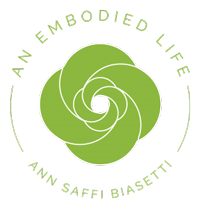

“Dr. Biasetti’s work hits the sweet spot where self-compassion training and eating disorder recovery intersect—the body—and she shows how compassionate, embodied awareness heals.”
—Christopher Germer, PhD, author of The Mindful Path to Self-Compassion

From the Author:
My hope is that this book offers you a different view on recovery—one that moves beyond just the recovery from harmful behaviors and instead offers a holistic and integrative view that values the freedom and recovery of your body, your mind, and your full self. This book sees your body as not just something to be healed or restored but rather as a source of great wisdom and knowledge. It also acknowledges your spirit and its importance in assisting you back into life and a full and lasting recovery, or what we can also look at as a great self-discovery. My hope as a clinician is to present another way for you to perceive and embrace your recovery process, one that encompasses a holistic approach to mind, body, and spirit and breaks through the mind-body divide. This view focuses on what is needed most—self-compassion, self-care, and connection to yourself and others—to heal and sustain recovery. Together we will begin a new path of integrated recovery and healing so you can step back into a fully lived life.
Ann Saffi Biasetti, Ph.D., LCSW author of Befriending Your Body A Self-Compassionate Approach to Freeing Yourself from Disordered Eating
Those who struggle with disordered eating often find themselves in an unrelenting cycle of harsh self-judgment, painful emotions, and harmful behaviors. Seeing the body as an adversary, these patterns can lead many people to become withdrawn or isolated. Ann Saffi Biasetti’s powerful holistic approach to liberating people from disordered eating focuses on growing self-compassion and embodiment. This insight, informed by yoga and mindfulness meditation, views the body not just as something to be healed or restored but as a source of great wisdom and knowledge. Dr. Biasetti offers yoga-based movement, body-awareness practices, meditations, and journaling exercises to help release long-held habits of self-criticism and perfectionism. Her step-by-step program will rebuild self-compassion, self-care, body awareness, acceptance, and connection to the self and to others.
For Information on My Befriending Your Body Program please visit my new website at www.befriendingyourbodyprogram.com
Frequently Asked Questions About Befriending Your Body
Can other people without disordered eating benefit from the book?
Absolutely! Any suffering, especially other addictions and trauma leaves us feeling lost and alone. The phases of recovery explored as well as the practices offer anyone suffering a chance to recover and heal the “self” in a holistic, integrated way.
Is this book just for one type of eating disorder?
No, this book is for all eating disorders and disordered eating habits and body image issues, as all of this relates to the same lack of embodied connection and awareness, along with a critical mindset.
What if I feel I am not ready to recover or am not sure I have an issue?
I understand your hesitation. If you are questioning and unsure see what it is like to just read the introduction and first two chapters. The book is meant to be read slowly as it is a program of recovery. Go at your own pace and do not rush through. Healing from anything takes time.
Can I just read it without doing the practices or answering the questions?
The book is formulated as a program of recovery. I highly encourage you to give yourself the time and energy to partake in the reflective questions and in the practices. It is meant to be experiential learning, different than other books. If you read the book without partaking in the practices you may not receive the full benefit. The practices offer a whole new area of knowledge that has been missing and is the way for you to finally do something different this time around.
Can I read a little bit at a time?
Yes! Read at your own pace. I suggest reading slowly and then going back to the phase/chapter you feel you relate to the most and keep doing the practices and the self-reflective questions. Stay there until it feels complete. That is the most self-compassionate way you can read this book.
Can I integrate these practices along with other forms of treatment I am receiving?
Yes, the practices are universal practices that are meant to sit alongside any particular type of therapy, meaning they can be an adjunct to the treatment you are already receiving. The main topics in the book self-compassion and embodiment are important topics to be integrated in all forms of treatment.
Is this book just for females?
No, this book is for all genders, although it was based on my dissertation research, which did focus on females in recovery. Self-compassion and embodiment, the two concepts the book is based on, are universal, human needs that cross all genders.
For publicity please contact: Katelin Ross | kross@shambhala.com

